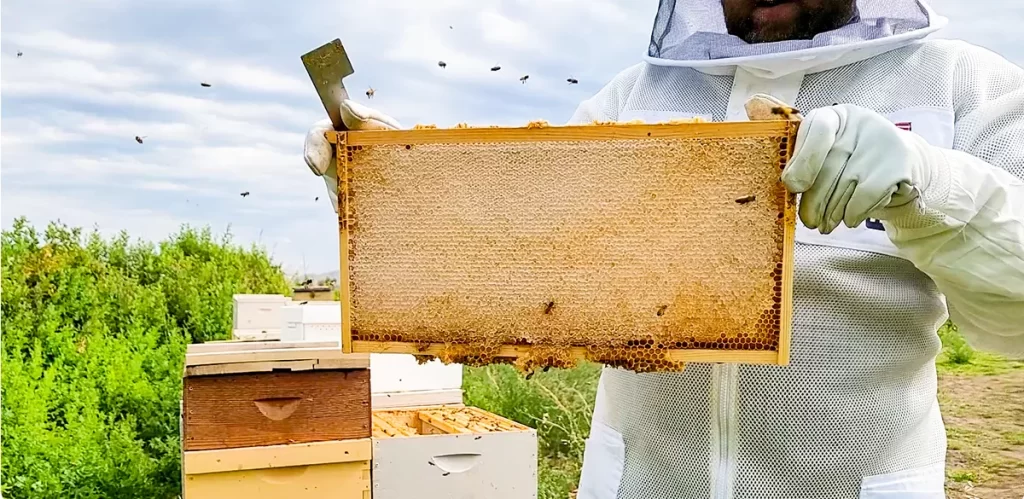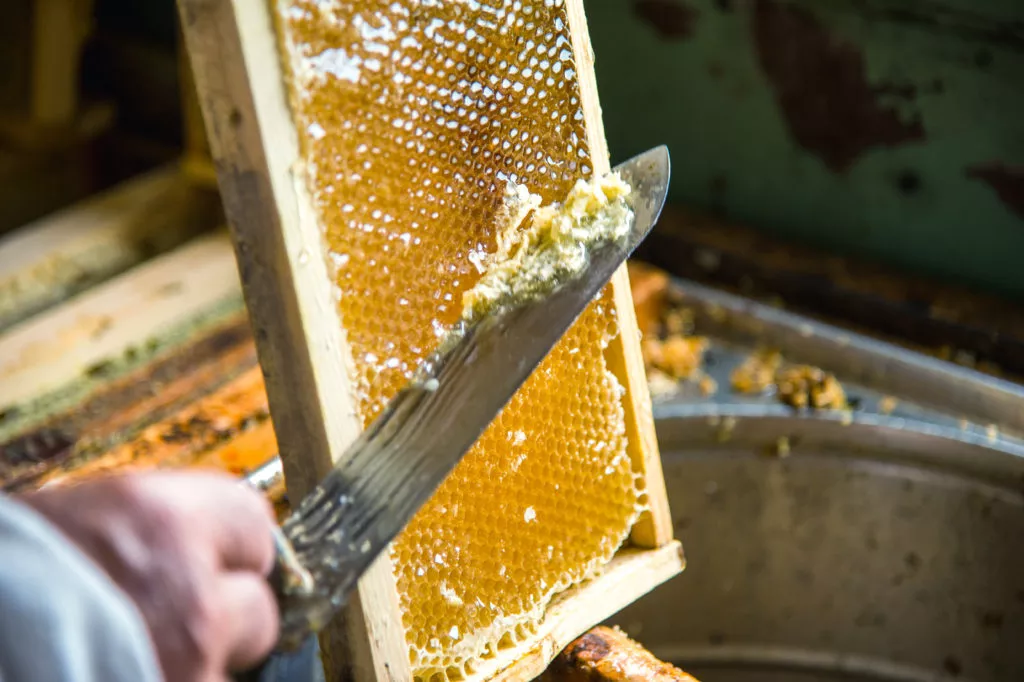We know that honey is one of the best health foods and an important source of income for beekeepers. But how does the honey-harvesting process affect our honey-producing bees? Is honey picking bad for bees? Or is this really a good thing for us and them? When I first started beekeeping, I wasn’t quite sure, so I decided to publish this article to share with you what I found in my research to understand the beekeeping process and how it affects bees.
Is Honey Picking Bad For Bees?
In most cases, gathering honey will not harm bees. Because of their foraging instincts, bees often ingest too much pollen from nearby flowers, producing more honey than they actually need. They also keep producing honey during the event. This leaves a huge surplus for beekeepers who can take it out without endangering the bees.

The principles of beekeeping are very similar around the world, but whether or not bees are injured while gathering honey depends on the beekeeper and how they work.
Precautions To Keep Bees From Getting Hurt When Beekeeping
Read more: Raw vs Organic vs Filtered vs Unfiltered Honey: Which Is Best?
First, in order to make it easier to collect honey and protect your bees, you should make sure that your bees are properly housed. A high-quality beehive is both a home and a food pantry for the bees. If you don’t use real hives, this is where you might start harming the bees – they can get infected, get colds, have too much or too little space.
After putting bees in a real hive, you’ll want to check these guys from time to time. You may need to help your bees here and there. But that’s exactly what a good beekeeper does – making sure your bees have everything they need to grow and thrive as a colony.
It is also critical to provide bees with an adequate source of nectar to produce as much honey as possible and avoid over-harvesting later in the year. This is especially true in cooler climates, where bees can no longer make the honey they need for winter. A smart beekeeper knows all these things and won’t compromise the health of the bees for honey – the beekeeper and his bees should work as a team.
The health of bee colonies, which typically consist of up to 80,000 bees, is largely reflected in honey supply and honey quality. Too much or too little honey, as well as honey from chemically fertilized plant pollen, can affect bees’ chances of survival and reproduction. Sustainable beekeeping protects current and future generations of bees by preventing colonies from swarming or dying.
How To Make Sure Bees Have Enough Honey In Their Hives
Worker bees spend most of their time viewing flowers, gathering nectar, and producing honey. Honey production is very important to bees because they depend on honey as their main food source (fun fact: the queen bee chooses to be the future queen of the female larvae fed royal jelly instead of honey). This means there should be enough food to feed the entire colony at any given time.
I recommend that you set aside at least 30 pounds of honey for bees to eat throughout the winter. In earlier seasons, when most bees are young and in the best health, more honey can be collected, knowing they will be replenished soon. Most beekeepers agree that it is best to harvest honey no more than twice a year—once in spring and once in late fall. I also recommend that you do not harvest from new hives in the first year.
Some years spring later than others and may even be harvested only once. As the year’s nectar supply will decrease, bees will be producing honey much more slowly, making it more difficult to replenish already low stocks. Harvest can be done in the fall when the bees are producing as much honey as possible.
Read more: Light Honey Vs Dark Honey: Differences, Uses, Appearance, Taste
Sustainable Honey Extraction From Beehives
Where possible for humans, beekeepers ensure that bees are temporarily removed from the hive without being displaced or injured. As long as the bees and their hives are free of parasites, pathogens and pesticides during the production and harvesting of this honey, no harm is done to the bees.
To harvest honey in a bee-friendly way, use a smoker to gently suck up the hive using a chemical-free fuel source such as cotton, leaves, or grass. This calms the bees so that the individual frames inside the hive can be removed to pull them out. Calm bees are less defensive and won’t hurt themselves if you do it right.
To ship the frame to your home or garage, you’ll need to carefully remove the bees. All it takes is a bee brush to put the bees on the comb and roll them away, or shake the frame until the bees fly away. If done correctly, these methods can get all the bees out of the frame relatively quickly without actually hurting the bees.
Transporting the frame away from the hive is also one of the measures to avoid harming the bees. That’s why. To complete the honey harvest, you must extract the honey from the frame. This is usually done with a honey extractor that allows multiple frames to be used at once. Once all the frames are placed in the slots around the reels, the frames spin at high speed. This centrifugation collects honey at the bottom, which can then be drained into a bowl or bucket. During this process, some of the bees around the frame may be crushed by the extractor. However, this is easily prevented if the beekeeper is careful and keeps the bees away.
Once the honey is removed from the frame, they are put back into the hive for reuse by the bees. Worker bees will also remove sticky honey residue from the frames they use for food.
Beehives need to be inspected frequently to spot pests or disease-causing fungi and bacteria as soon as they invade. These can be removed manually or new frameworks may need to be added. Chemical pesticides and fungicides are strongly discouraged as they also kill bees and make honey unfit for consumption.

What If The Beekeeper Doesn’t Harvest The Excess Honey In The Hive?
Not having harvested hives is not necessarily a good thing. Bees may find their space too small and will swarm and abandon the hive in search of a larger home. Another possibility is that the bees do not leave the hive, but store the honey in the hive used for beekeeping. When this happens, the colony is unable to raise new bees, and the strength and numbers of the next generation decline.
Read more: What Happens When You Add Honey To Hot Tea? Does Honey Lose Nutrients?
How Much Honey Is Harvested From An Average Healthy Hive?
Each super unit produces an average of 30 to 70 pounds of honey per year, depending on size and depth. A flat super will yield about 2 to 2.5 gallons of honey (25-30 lbs.). Meanwhile, a medium-depth Super will yield 3 to 4 gallons (35 to 40 pounds), while a full-depth Super will yield 5 to 6 gallons (60 to 70 pounds).
Most hives contain multiple super hives stacked together, allowing beekeepers to easily make over a hundred pounds of honey. Under ideal rearing and environmental conditions, the amount of honey per super can also exceed these specified values.
Is Beekeeping Immoral And Cruel?
Basically, sustainable beekeeping is not immoral and cruel. But in some cases, bees are exploited for higher profits, and all sustainable practices are forgotten. Here are some examples of using bees to improve yields: harvesting almost all the honey in the hive, feeding bees only sugar in winter, increasing the size of honeycomb cells, using antibiotics and pesticides.
It’s All Up To You – The Beekeeper
Whether gathering honey harms the bees, and whether beekeeping is unethical or cruel, is really up to the beekeeper. If you are new to beekeeping, I highly recommend starting in a proper and sustainable way. This will ensure that both colonies are strong and that you are helping future generations of bees and beekeepers in the right way.
